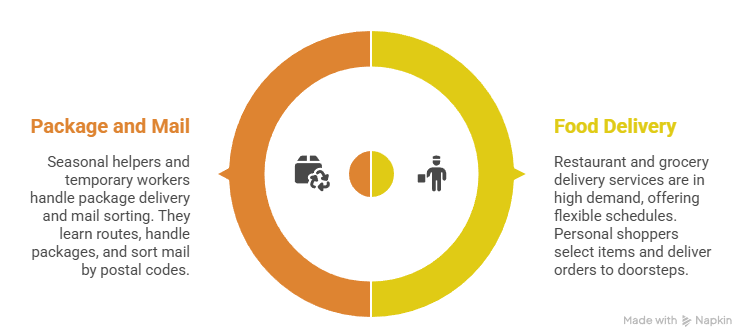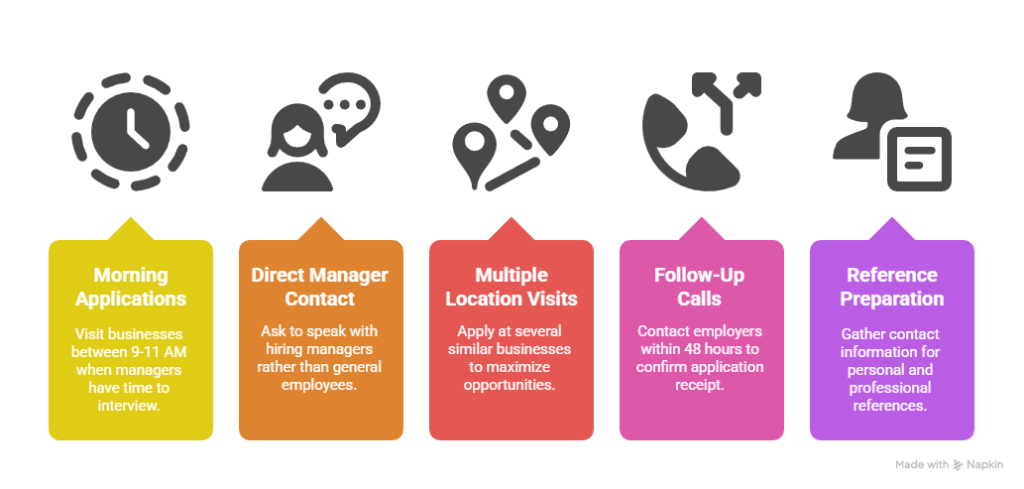Fall seasonal employment offers abundant opportunities for workers seeking immediate income without extensive screening processes, particularly in agriculture, retail, and event services industries. These autumn seasonal employment positions typically prioritize availability and work ethic over criminal history verification.
Key Takeaways
- Agricultural and harvest jobs represent the largest category of fall jobs with no background check opportunities, with over 2 million seasonal positions available nationwide during October hiring season.
- Retail seasonal positions begin recruiting in September, focusing on customer service skills rather than background verification for most entry-level roles.
- Event staffing companies prioritize immediate availability for Halloween, harvest festivals, and fall weddings over comprehensive screening processes.
- Warehouse and fulfillment centers scale up operations significantly for holiday preparation, offering same-day hiring for qualified candidates.
- Food service establishments expand staff for fall catering, pumpkin spice seasonal menus, and increased customer traffic without requiring background checks.
- Landscaping and outdoor maintenance companies need additional workers for leaf removal, winterization services, and property preparation before winter months.
Agriculture and Harvest Work Opportunities

Agricultural employers consistently offer the most accessible fall employment without background verification requirements. These positions focus on physical capability and work availability rather than past employment or criminal history. The seasonal nature of harvest work creates urgent staffing needs that prioritize immediate hiring.
Apple orchards across the country begin harvesting in late August through November. Workers earn between $12-18 per hour with many farms offering daily pay options. Pumpkin farms start hiring in September for harvest and customer service positions. Most operations provide on-the-job training within the first day of work.
Corn mazes and pumpkin patches need seasonal staff for weekends and evenings. These positions often include hayride operators, maze guides, and farm stand attendants. Many farms offer employee discounts on produce and seasonal items. The work environment is typically outdoors with flexible scheduling options.
Apple Orchard Employment
Apple picking requires basic physical fitness and comfort working on ladders. Most orchards provide picking bags, ladders, and safety equipment at no cost to workers. Pay rates vary by location but typically range from $12-16 per hour.
Sorting and packing positions work in climate-controlled facilities during all weather conditions. These jobs require attention to detail and basic math skills for counting and weighing. Workers often advance to supervisory roles within the same season based on performance.
Pumpkin Farm Positions
Pumpkin harvesting involves cutting vines, loading trucks, and organizing displays throughout the property. Workers use basic hand tools provided by the farm. Most positions offer piece-rate bonuses for exceeding daily quotas. Weekend work typically pays premium rates during peak season.
Customer service roles at pumpkin patches include operating cash registers and assisting families with selections. These positions require friendly communication skills and basic math abilities. Many farms provide uniforms and seasonal employee parties as additional benefits.
Retail and Customer Service Positions

Retail establishments begin autumn seasonal employment recruitment in early September to prepare for increased holiday shopping traffic. Most entry-level positions focus on customer interaction skills and schedule flexibility rather than comprehensive background screening. Store managers prioritize filling positions quickly over extensive verification processes.
| Position Type | Average Pay Range | Typical Benefits |
| Sales Associate | $9-15/hour | Employee discounts, flexible scheduling |
| Stock Clerk | $10-16/hour | Overtime opportunities, immediate start |
| Cashier | $8-14/hour | Customer interaction, training provided |
| Gift Wrapper | $9-13/hour | Creative environment, seasonal bonuses |
Department stores, specialty retailers, and big-box stores all increase staffing for fall and winter shopping seasons. Many positions offer immediate start dates with abbreviated training periods. Employee discount programs often extend to family members during employment.
Halloween and Costume Retail
Seasonal costume shops and party supply stores hire extensively from September through early November. These businesses focus on enthusiasm and customer service skills over employment history. Workers often receive costume allowances and creative freedom in store displays.
Pop-up Halloween stores in malls and shopping centers offer concentrated employment during peak season. These positions typically last 6-8 weeks with potential for holiday season extension. Management roles may be available for experienced retail workers.
Seasonal Department Store Work
Major department stores begin seasonal hiring in August for fall fashion launches and holiday preparation. Stock room positions require physical ability to lift boxes and organize merchandise. Sales floor associates need basic customer service skills and product knowledge training.
Evening and weekend shifts often pay differential rates during busy shopping periods. Many stores offer employee appreciation events and recognition programs for seasonal staff. Performance during seasonal employment often leads to permanent position offers.
Event Staffing and Entertainment Services
Event staffing companies experience peak demand during fall wedding season, harvest festivals, and Halloween celebrations. These employers prioritize immediate availability and professional appearance over background verification for most positions. The temporary nature of event work creates streamlined hiring processes.
Wedding vendors need additional staff for weekend events throughout autumn months. Catering assistants set up tables, serve food, and clean venues after celebrations. Setup crews arrive early to arrange decorations and equipment before guests arrive. Most companies provide uniforms and transportation between venues when needed.
- Festival booth assistants: $10-14/hour helping vendors with sales and setup
- Security personnel: $12-18/hour monitoring crowds and parking areas
- Food service workers: $9-15/hour preparing and serving festival foods
- Cleanup crews: $11-16/hour restoring venues after events
- Ticket sales staff: $8-13/hour processing admissions and answering questions
Halloween attractions create hundreds of temporary jobs in haunted houses, corn mazes, and seasonal entertainment venues. These employers seek enthusiastic workers who enjoy interacting with customers in creative environments.
Wedding and Party Services
Catering companies expand staff significantly during the fall wedding season from September through November. Servers, bartenders, and kitchen assistants work weekend events with premium pay rates. Most positions provide same-day training and flexible scheduling around other commitments.
Event setup and breakdown crews work before and after celebrations to prepare venues. These positions require physical ability to lift tables, chairs, and decorative items. Teams often develop camaraderie working together on multiple events throughout the season.
Halloween Entertainment Venues
Haunted attractions hire actors, makeup artists, and customer service staff for seasonal operations. Acting positions require enthusiasm and ability to stay in character for extended periods. Makeup artists often receive specialized training in theatrical techniques and special effects.
Corn mazes and haunted trails need guides, security staff, and concession workers for evening operations. These positions typically work weekends and Halloween week with intensive scheduling. Many venues offer employee parties and recognition awards for outstanding performance.
Warehouse and Fulfillment Operations

Distribution centers and fulfillment warehouses significantly increase staffing during fall months to prepare for holiday shipping demands. These employers focus on physical capability and attendance reliability rather than comprehensive background screening. Same-day hiring events are common throughout September and October.
Amazon fulfillment centers, FedEx hubs, and UPS facilities offer immediate employment with competitive wages and benefits packages. Package handlers sort items, load trucks, and prepare shipments for delivery. Night shift positions often include premium pay rates and shift differentials. Training programs last one to three days with ongoing skill development opportunities.
Forklift operators need certification but many warehouses provide training at no cost to employees. Quality control inspectors check products and packaging for defects or damage. Loading dock workers coordinate truck arrivals and departures throughout busy shipping periods. Most facilities offer overtime opportunities during peak season from October through December.
Package Handling Positions
Entry-level package handlers start immediately after brief safety training and facility orientation. Workers sort packages by destination, scan barcodes, and load delivery vehicles. Physical demands include lifting up to 50 pounds and standing for extended periods. Most facilities provide safety equipment and ergonomic training to prevent injuries.
Career advancement opportunities exist for reliable workers who demonstrate leadership skills. Shift supervisors, quality trainers, and safety coordinators often promote from within seasonal staff. Many warehouses offer tuition assistance and skills training for permanent employees.
Seasonal Shipping Support
Peak shipping season creates specialized positions for gift wrapping, expedited processing, and customer service support. Gift wrappers work in climate-controlled areas with flexible scheduling options. Expedited processing teams handle rush orders and time-sensitive shipments with accuracy requirements.
Customer service representatives answer phones, track packages, and resolve shipping issues during busy periods. These positions require basic computer skills and professional communication abilities. Remote work options may be available for qualified candidates with home office setups.
Food Service and Hospitality Work
Restaurants, catering companies, and food service establishments expand operations during fall months for seasonal menu offerings and increased customer traffic. Most positions focus on food safety knowledge and customer service skills rather than background verification. Training programs are typically provided for inexperienced workers.
Kitchen positions include food preparation, dishwashing, and line cooking with varying skill requirements. Food prep assistants wash vegetables, measure ingredients, and maintain clean work areas. Dishwashers ensure clean plates, utensils, and cooking equipment throughout service periods. Line cooks prepare menu items according to recipes and presentation standards.
Front-of-house roles involve customer interaction, order taking, and payment processing. Servers take orders, deliver food, and provide dining recommendations to restaurant guests. Host staff greet customers, manage waiting lists, and coordinate table assignments during busy periods. Delivery drivers transport food orders to customers using personal vehicles or company cars.
Restaurant Kitchen Work
Kitchen assistants support experienced cooks with ingredient preparation and equipment maintenance. These positions require attention to food safety protocols and ability to work in fast-paced environments. Most restaurants provide uniforms, meals during shifts, and flexible scheduling around school or other commitments.
Dishwashing positions offer immediate employment with minimal skill requirements beyond reliability and work ethic. Workers operate commercial dishwashing equipment and maintain sanitation standards. Many dishwashers advance to food preparation or cooking positions within the same establishment.
Catering and Special Events
Wedding caterers and corporate event companies need additional staff for the fall celebration season. Catering assistants help prepare food, set up buffets, and serve guests at off-site locations. These positions often work weekends with travel between different venues throughout the region.
Special event servers work festivals, parties, and corporate functions with premium pay rates. Workers provide professional service while representing catering companies to potential future clients. Many caterers offer profit-sharing bonuses and employee referral incentives for successful seasonal workers.
Landscaping and Outdoor Maintenance
Property maintenance companies experience peak demand during fall months for leaf removal, winterization services, and seasonal cleanup projects. Physical capability and equipment operation skills are prioritized over employment history verification. Many companies provide tool training and transportation assistance for reliable workers.
- Leaf removal specialists: $11-16/hour operating rakes, blowers, and collection equipment
- Gutter cleaning technicians: $13-19/hour working on ladders and rooftops safely
- Winterization crews: $12-18/hour preparing properties for cold weather months
- Tree trimming assistants: $10-15/hour supporting certified arborists with equipment
- Landscape cleanup workers: $9-14/hour removing debris and organizing outdoor spaces
Equipment training is provided for power tools, leaf blowers, and small machinery used in outdoor maintenance work. Safety protocols include proper lifting techniques and protective equipment usage.
Residential Landscaping Services
Homeowner services include weekly leaf removal, gutter cleaning, and storm preparation throughout autumn months. Workers develop regular client relationships and may receive tips for exceptional service. Seasonal employment often extends through winter months for snow removal operations.
Property management companies hire crews for apartment complexes, condominiums, and commercial properties. These positions offer steady work with consistent scheduling throughout the fall season. Advancement opportunities include crew leader roles and equipment operator positions.
Delivery and Transportation Services
Package delivery services, food delivery platforms, and transportation companies increase staffing for fall shipping demands and holiday preparation. These positions typically require valid driver's licenses and reliable vehicles rather than extensive background screening. Flexible scheduling allows workers to choose daily hours and delivery areas based on personal availability and transportation resources.
- Restaurant delivery drivers: $10-18/hour plus tips working for establishments or platforms like DoorDash
- Package delivery helpers: $13-19/hour assisting regular drivers during peak October-December seasons
- Grocery delivery shoppers: $11-16/hour selecting items and delivering to customer doorsteps
- Mail sorting workers: $12-17/hour processing holiday cards and packages in climate-controlled facilities
- Food platform drivers: $9-15/hour base pay with flexible scheduling and daily payment options
- Seasonal postal assistants: $14-20/hour handling increased mail volume during busy periods
Most delivery positions offer daily payment options through direct deposit or debit cards for immediate income access. Tips and delivery fees supplement hourly wages significantly during busy fall and winter periods when customers increase service usage.

Food Delivery Opportunities
Restaurant delivery drivers work directly for establishments or through third-party platforms with increased demand during cooler weather. Workers set their own schedules and choose delivery areas based on personal preferences and vehicle capabilities.
Grocery delivery services expand operations for customers avoiding shopping trips during busy seasons. Personal shoppers select items, communicate with customers about substitutions, and deliver orders to doorsteps with customer service skills and time management abilities.
Package and Mail Services
Seasonal package delivery helpers work alongside experienced drivers during peak shipping periods learning routes and customer preferences. Workers receive on-the-job training covering package handling techniques and safety procedures for working around delivery vehicles.
Mail sorting facilities hire temporary workers for holiday card and package processing in climate-controlled environments. These positions offer flexible shift options with workers sorting mail by postal codes and operating scanning equipment to maintain processing standards.
Seasonal Manufacturing and Production
Manufacturing facilities increase production during fall months for holiday merchandise, seasonal products, and gift items. These employers focus on work ethic and reliability rather than employment history for most entry-level positions. Production workers receive comprehensive training on safety procedures and quality standards before beginning work.
Toy manufacturing ramps up significantly for holiday season preparation starting in September. Assembly line workers build products, package items, and inspect finished goods for quality defects. Shift work includes days, evenings, and weekends with overtime opportunities during peak production periods. Most facilities provide safety equipment and ergonomic training to prevent workplace injuries.
Food processing plants increase staffing for seasonal products like holiday cookies, candy, and specialty items. Workers operate packaging equipment, maintain sanitation standards, and follow recipe specifications accurately. Quality control inspectors ensure products meet safety and taste standards before distribution. These positions often offer permanent employment opportunities for dedicated seasonal workers.
Product Assembly Lines
Assembly line positions require attention to detail and ability to perform repetitive tasks efficiently. Workers follow detailed instructions to build products according to specifications. Training periods last several days with ongoing supervision until workers demonstrate competency. Piece-rate bonuses reward workers for exceeding daily production quotas.
Packaging specialists prepare finished products for shipping with proper labeling and protection materials. These positions work in clean environments with quality control requirements. Workers advance to machine operator or quality inspector roles based on performance and interest in additional responsibilities.
Quality Control and Inspection
Quality inspectors check products for defects, proper assembly, and packaging standards throughout production processes. These positions require good eyesight and attention to detail for identifying problems before products ship to customers. Training covers company quality standards and documentation procedures for tracking issues.
Final inspection teams verify completed products meet all specifications before packaging and shipping. Workers use measuring tools, test equipment, and visual inspection techniques to ensure quality. These positions often lead to supervisory roles or specialized technical positions within manufacturing facilities.
Application Strategies and Success Tips
Successful candidates for fall jobs with no background check positions demonstrate reliability, enthusiasm, and immediate availability during the application process. Direct contact with hiring managers often yields better results than online applications during peak seasonal hiring periods. Employers appreciate proactive candidates who understand seasonal business demands and time-sensitive staffing needs.
Timing applications correctly increases chances of employment significantly during autumn seasonal employment rushes. Agricultural employers begin hiring in late August for September harvests. Retail stores start recruitment in early September for October sales increases. Event staffing companies hire continuously throughout the fall season as bookings confirm.

- Morning applications: Visit businesses between 9-11 AM when managers have time to interview
- Direct manager contact: Ask to speak with hiring managers rather than general employees
- Multiple location visits: Apply at several similar businesses to maximize opportunities
- Follow-up calls: Contact employers within 48 hours to confirm application receipt
- Reference preparation: Gather contact information for personal and professional references
Professional appearance and positive attitude create strong first impressions during walk-in applications. Dress appropriately for the work environment while maintaining a clean, neat appearance.
Interview Preparation Techniques
Research companies before interviews to understand their seasonal needs and peak business periods. Prepare specific examples of reliability, teamwork, and problem-solving abilities from previous experiences. Practice explaining employment gaps or criminal history honestly without providing excessive detail about personal circumstances.
Emphasize flexibility, availability, and willingness to work weekends or holidays when most seasonal businesses need additional coverage. Demonstrate understanding of physical demands and weather conditions associated with outdoor work positions. Ask thoughtful questions about training, advancement opportunities, and company culture during interviews.
Legal Considerations and Worker Rights
Understanding employment rights and legal protections helps seasonal workers navigate potential workplace issues during autumn seasonal employment. Fair Labor Standards Act provisions apply to all workers regardless of background check requirements or employment duration. Workplace safety regulations remain in effect for temporary and seasonal positions with full OSHA protection coverage.
Wage and hour laws guarantee minimum wage payment and overtime compensation after 40 hours per week for non-exempt employees. Employers must provide accurate time tracking and regular pay periods regardless of seasonal status. Workers have rights to meal breaks, rest periods, and safe working conditions as established by federal and state regulations.
Discrimination protections apply to seasonal workers including equal treatment regardless of race, gender, age, or disability status. Employers cannot refuse employment based on arrest records or criminal history unless directly related to job responsibilities. Workers experiencing discrimination should document incidents and contact appropriate regulatory agencies for investigation.
Workplace Safety Requirements
Employers must provide safety training, protective equipment, and hazard communication for all seasonal workers. Construction, agriculture, and warehouse positions require specific safety protocols and equipment at no cost to employees. Workers have rights to refuse unsafe work and report hazardous conditions without retaliation from employers.
Injury reporting procedures must be explained during orientation with workers' compensation coverage information provided. Seasonal employees receive the same medical benefits and wage replacement as permanent staff for work-related injuries. Emergency contact procedures and first aid resources should be clearly posted in all work areas.
Conclusion
Fall seasonal employment provides immediate income opportunities across diverse industries without background check barriers for motivated workers. Agricultural harvest work, retail expansion, event staffing, and outdoor maintenance create thousands of positions with flexible hiring processes. Success requires proactive application strategies, reliable work habits, and understanding of seasonal business cycles that drive increased staffing needs. Workers benefit from knowing their legal protections while employers gain access to enthusiastic seasonal staff through streamlined recruitment processes during autumn's peak hiring period.
Frequently Asked Questions
What types of fall jobs typically don't require background checks?
Agricultural positions, retail seasonal work, event staffing, warehouse operations, food service roles, and landscaping jobs commonly hired without background verification. These industries prioritize immediate availability and basic job skills over extensive screening processes during peak autumn hiring periods.
How quickly can I start working at fall seasonal jobs?
Many fall employers offer same-day hiring with immediate start dates, particularly in agriculture, warehousing, and event staffing. Retail positions may require 2-3 days for scheduling, while food service roles often begin within one week of application.
Do pumpkin farms and apple orchards perform background checks?
Most agricultural operations, including pumpkin farms and apple orchards, focus on physical capability and work availability rather than background verification. These employers typically hire based on immediate need and demonstrated work ethic during harvest season.
What fall jobs hire immediately without experience?
Entry-level positions in apple picking, retail stock clerking, warehouse package handling, food prep assistance, and leaf removal services frequently hire inexperienced workers immediately. These employers provide on-the-job training and focus on reliability over previous experience.
Are there fall jobs that pay daily or weekly?
Yes, many agricultural operations, construction crews, and event staffing companies offer daily pay options. Landscaping services and some warehouse facilities provide weekly payment schedules, while most retail positions follow standard bi-weekly payroll cycles.
What should I expect for wages in fall seasonal jobs?
Fall seasonal wages typically range from $9-22 per hour depending on location, industry, and skill requirements. Agricultural work averages $11-16/hour, retail positions pay $9-15/hour, warehouse jobs offer $13-19/hour, and specialized outdoor services can reach $20+/hour.
Do I need special equipment for fall seasonal work?
Most employers provide necessary tools and equipment, though workers may need basic items like work boots, gloves, and weather-appropriate clothing. Some positions offer equipment allowances or reimburse personal protective equipment purchases.
Can fall seasonal jobs lead to permanent employment?
Many seasonal positions transition to permanent roles based on performance and business needs. Retail stores often retain successful seasonal workers, while agricultural operations may offer year-round greenhouse or equipment maintenance positions.
Additional Resources
- State Labor Department Job Search Resources
https://www.dol.gov/agencies/eta/state-contacts - USDA Agricultural Employment Information
https://www.usda.gov/topics/farming/seasonal-agricultural-workers - Fair Labor Standards Act Worker Rights Guide
https://www.dol.gov/agencies/whd/flsa - OSHA Seasonal Worker Safety Guidelines
https://www.osha.gov/seasonal-workers - National Agricultural Workers Survey Data
https://www.doleta.gov/naws/ - Seasonal Employment Tax Information
https://www.irs.gov/businesses/small-businesses-self-employed/seasonal-employees
Still have questions?
Get in touch with our team today for a personalized demo and discover how our tailored volume pricing and packages can drive results for your business!
How useful was this page?*
Note: your comments are anonymous. We use them to improve the website. Do not include any personal details.
Visit our FCRA Compliance Tool or leave a message here if you need a response.
From the blog Explore the GCheck Content Hub

How Long Does a Background Check Take? A Complete 2025 Guide
13 Dec, 2023 • 14 min read
The Ultimate Background Check Guide
13 Dec, 2023 • 4 min read
The Ultimate Guide to Employment Background Checks
13 Dec, 2023 • 10 min readThe information provided in this article is for general informational and educational purposes only and should not be construed as legal advice or a substitute for consultation with qualified legal counsel. While we strive to ensure accuracy, employment screening laws and regulations—including but not limited to the Fair Credit Reporting Act (FCRA), Equal Employment Opportunity Commission (EEOC) guidelines, state and local ban-the-box laws, industry-specific requirements, and other applicable federal, state, and local statutes—are subject to frequent changes, varying interpretations, and jurisdiction-specific applications that may affect their implementation in your organization. Employers and screening decision-makers are solely responsible for ensuring their background check policies, procedures, and practices comply with all applicable laws and regulations relevant to their specific industry, location, and circumstances. We strongly recommend consulting with qualified employment law attorneys and compliance professionals before making hiring, tenant screening, or other decisions based on background check information.

